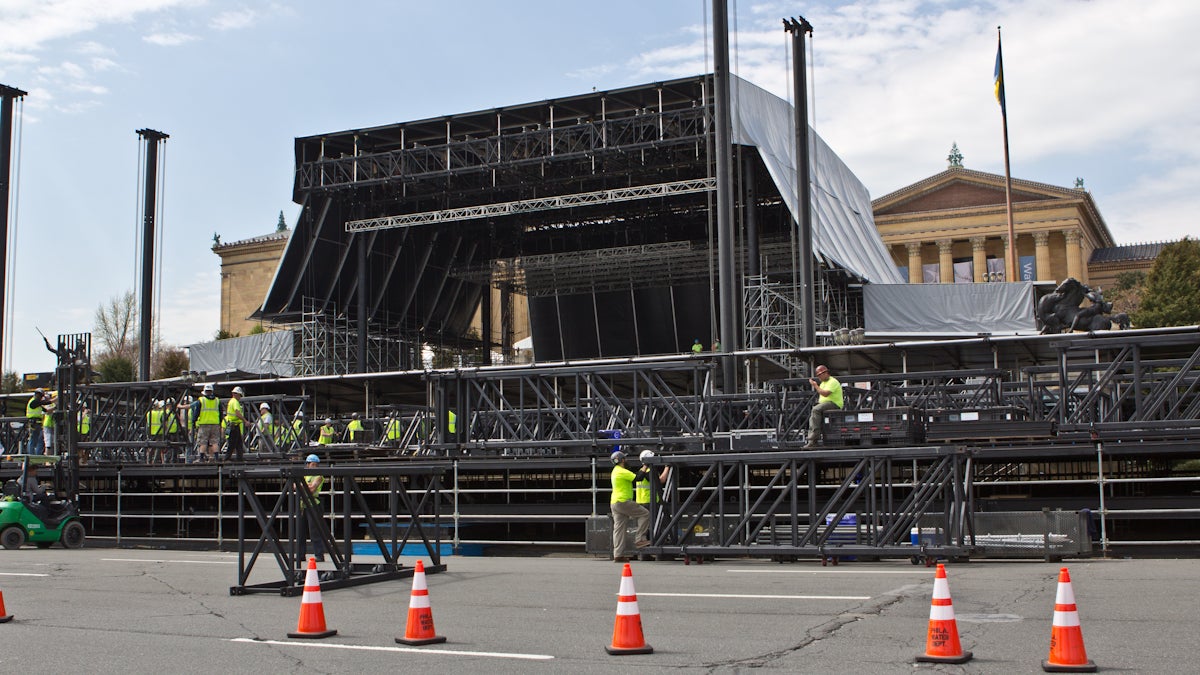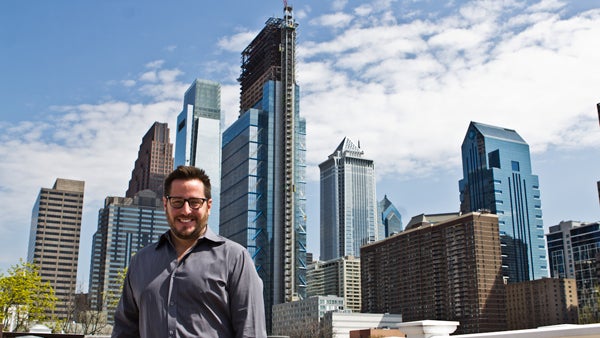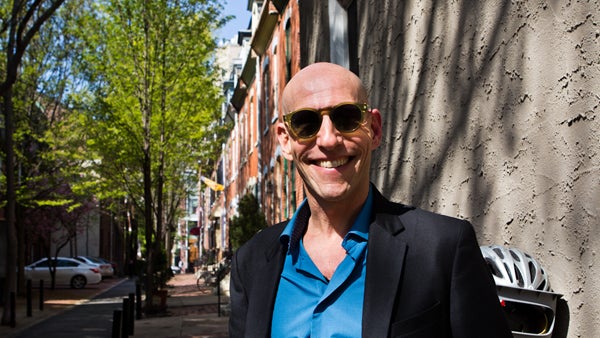Some neighbors say Philly fumbled on getting out NFL draft information
Listen
Preparations for the NFL Draft, April 27 to 29, are happening on the steps of the Philadelphia Museum of Art. (Kimberly Paynter/WHYY)
Getting around Philadelphia’s museum district is becoming tougher as streets by the Benjamin Franklin Parkway continue to close and crews in neon-yellow vests scramble to build everything in time for the 2017 NFL Draft next week.
For nearby residents, the three-day event is more than a passing inconvenience. For nearly three weeks, their daily routines will be rattled.
City officials, who said they began talking to neighborhood groups and cultural institutions about the $25 million event months ago, said they have been thorough about disseminating details since. Neighbors, however, are giving government a mix of grades for communication.
Most of the information went out in the course of traditional neighborhood meetings with affected residents, mostly in and around Fairmount and Logan Square. There has also been a constant flow of accompanying email exchanges and phone calls. Tweets and blog posts from the city and mayor’s accounts too, said mayoral spokeswoman Lauren Hitt.
“I would be just kind of shocked if there were a significant number of people who didn’t feel like they heard this,” said Hitt. “I have no doubt that there are one or two people who were complaining we weren’t thorough enough. There always will be.”
Drew Murray, president of the Logan Square Neighborhood Association, said he is pleased with the city’s performance. He’s not thrilled about the disruption, but he feels ready to tackle it.
 Drew Murray is president of the Logan Square Neighborhood Association. (Kimberly Paynter/WHYY)
Drew Murray is president of the Logan Square Neighborhood Association. (Kimberly Paynter/WHYY)
“Literally when the draft was leaked, I believe by Congressman Brady, I got an email from the city that next morning apologizing for not coming to Logan Square Neighborhood Association first to tell us about the draft. They didn’t want us to find out via the paper,” said Murray.
The longtime resident also commends the city for taking some extra steps to ensure nearby residents feel less put upon. That includes placing portable toilets outside the event, extending cleanup efforts beyond the Parkway, and getting trash cans to the community sooner.
“The Big Belly trash cans that are in our community are shrink-wrapped for Homeland Security reasons,” explained Murray.
Others, such as Fairmount resident Brian Shapiro, are less enthusiastic about how the city handled its communication duties.
 Brian Shapiro is a resident of Philadelphia’s Fairmount neighborhood and says he understands how important events on the Parkway are, but wishes the city would talk more with residents to mitigate the complications. (Kimberly Paynter/WHYY)
Brian Shapiro is a resident of Philadelphia’s Fairmount neighborhood and says he understands how important events on the Parkway are, but wishes the city would talk more with residents to mitigate the complications. (Kimberly Paynter/WHYY)
Shapiro moved to the neighborhood five years ago and has grown to enjoy living near the Parkway. He’s not upset about the draft coming to town. He actually thinks it’s a “net positive” for the city — that it will do wonders for Philadelphia’s image.
Louder, clearer message sought
But Shapiro said he wishes the city had briefed his community — the way a good neighbor might if he or she were throwing a big party next door.
“You still might not be happy about it. You still might not be thrilled by the fact that you’re going to be disturbed, but there’s not the ancillary, ‘I can’t believe you didn’t even talk to me.’ That’s the component where, I don’t take it personally, I take it as an area the city can continue to work on,” said Shapiro.
He also said the city should let neighbors know not just about traffic and road closures, but why an event such as the NFL draft is worthwhile.
“We need to put on these events because it’s crucial for the economic development, this is crucial for tourism. This is crucial for the hospitality industry. All the numbers would bear this out,” said Shapiro, who is in the communications business.
City officials project the draft will score Philadelphia roughly $86 million in economic benefits. The final figure could exceed that total given the city’s proximity to New York and D.C. — two big football towns, experts said.
Chicago, which has hosted the draft the last two years, reaped more than $160 million during that span, according to analysis done by the Sports Industry Research Center at Temple University.
Brewerytown resident Cynthia Lombardi said knowing those figures may have made the draft more palatable, but she still thinks the city needs to improve its communication skills.
She found out about the draft from a friend who sent her a link to an article.
“There should be some kind of direct communication. Not everyone can make these civic association meetings, so how are you supposed to find out?” Lombardi said. “I wouldn’t have known until I saw it on TV or if this person didn’t send me that email and that was back in the end of March.”
Despite all the tweets, Facebook posts and other online information the city has posted, those searching the web are more likely to find news reports or even posts from the visitors bureau than information from the city.
Moving forward
This fall, city officials will sit down with community stakeholders to discuss events on the Parkway. It’ll be a debriefing of sorts, but also a chance for residents to chime in with policy changes the city should consider going forward.
One is already in the works. Hitt, with the myor’s office, said the city wants to make community engagement a requirement for all future vendor contracts. That way, the organization throwing the event and the city would share the responsibility of telling Cynthia Lombardi and other neighbors that their lives will, once again, be disturbed.
“We absolutely are going to continue to have large events on the Parkway. That won’t stop, because we think it’s a beautiful public space that can accommodate a lot of Philadelphians,” Hitt said. “But we also want to make sure that we’re being as considerate as we can be to all of the neighbors.”
WHYY is your source for fact-based, in-depth journalism and information. As a nonprofit organization, we rely on financial support from readers like you. Please give today.





